IRGC 'Advisor' Killed in Syria During Israeli Bombing
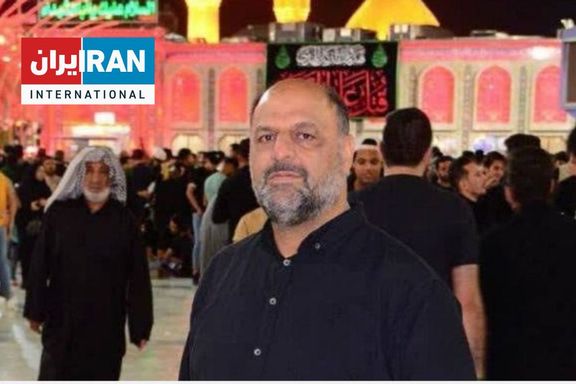
Iranian government media report that a Revolutionary Guard "advisor", Saeed (Saeid) Abyar was killed in an Israeli air strike near Aleppo, the second largest city in Syria early Monday.

Iranian government media report that a Revolutionary Guard "advisor", Saeed (Saeid) Abyar was killed in an Israeli air strike near Aleppo, the second largest city in Syria early Monday.
Earlier in the day, Syrian state media reported that an unknown number of people were killed in an Israeli air strike.
Abyar's rank is not clear, but the his designation as an advisor points to his likely high rank as an officer in the IRGC.
Iran claims its forces in Syria are advisors invited by the Syrian government, while since 2011 it has sent thousands of Iran, Afghan, Iraq and Pakistani militias to fight to defend President Bashar al-Assad against his opponents in the country's civil war.
This was the second reported attack on the country in less than a week, following a string of air strikes since the October 7 Hamas invasion of Israel. Some sources said the targets were affiliated with Iranian-backed forces in the region. Israel usually does not comment about its air strikes in Syria.
The strikes at around 12:20 a.m. early Monday (2120 GMT on Sunday) "led to a number of fatalities and some material damage", the source said, without elaborating. Independent sources have not reported more details so far.
A devastating air strike on April 1 flattened a building in the Iranian diplomatic compound in Damascus, where two senior Revolutionary Guard generals and five other officers died. Reportedly, these individuals were involved in operations aimed at intensifying attacks on Israel. This led to a massive Iranian missile and drone retaliatory attack against Israel on April 13, which inflicted minimal damage. Most projectiles were shot down.
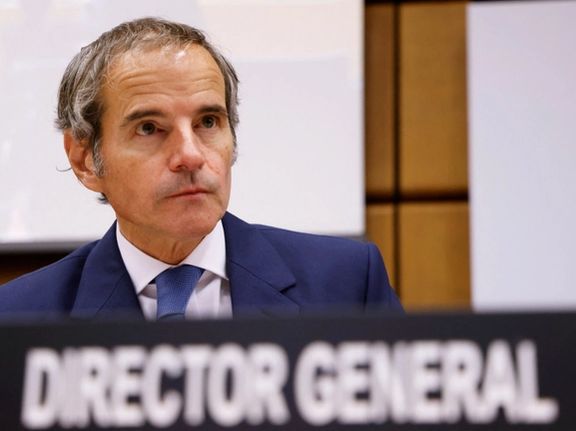
The UN's nuclear chief, Rafael Grossi, admitted the agency "has lost continuity of knowledge in relation to the production centrifuges, rotors and bellows, heavy water, and uranium" as Iran's nuclear program expands unabated.
During a session with the IAEA Board of Governors, Director-General Grossi stated, "Public statements made in Iran regarding its technical capabilities to produce nuclear weapons and possible changes to Iran’s nuclear doctrine only increase my concerns about the correctness and completeness of Iran’s safeguards declarations."
In response to Iran International about the proposed resolution by three European countries against the Islamic Republic, Grossi stated that the member countries must express their opinions on the matter and that the Agency is only obliged to comply with it if the resolution is approved.
Before the Board of Governors meeting, three diplomats told Reuters that three European countries have shared the draft text of their resolution with the member countries of the International Atomic Energy Agency.
Grossi commented on Iran's non-compliance with the Additional Protocol and Shamkhani's threat to stop cooperating with the Agency if a resolution is issued in the Board of Governors, saying that Iran will continue to cooperate with the Agency due to its legal obligations as a member of the NPT.
Grossi articulated concerns stemming from recent public declarations in Iran that hint at a potential doctrinal shift, which may no longer consider nuclear weapons as prohibited by Islam, as earlier claimed by the Supreme Leader Ali Khamenei. The shift comes amid provocations from top Iranian officials who have hinted at a reconsideration of the religious ban on nuclear arms.
The Director-General also expressed regret over Iran’s recent decision to continue barring several key IAEA inspectors from the country after inspectors detected uranium enrichment levels near weapon-grade in early 2022. The discovery revealed that Iran had enriched uranium to 84% in February 2022, nearing the 90% threshold considered weapons-grade. Just weeks ago, Grossi also warned Iran is "weeks not months" away from a nuclear weapon.
Grossi lamented that his recent efforts to foster cooperation were undermined, not least by the death of Iranian Foreign Minister Hossein Amir-Abdollahian. He acknowledged ongoing dialogues with other Iranian officials, including Vice-President Mohammad Eslami, but noted that substantial obstacles remain.
Admitting that Iran's uranium enrichment continues to intensify, Grossi said, "We know that Iran is considering a number of activities which require construction of new facilities, installing new cascades, among other things". In the Monday press conference, Grossi stressed the severity of the situation as the program continues unabated. "They should be informing us of these changes," he said.
Grossi pointed out that it has been over three years since Iran ceased applying its Additional Protocol, restricting the IAEA’s ability to perform comprehensive inspections. "There has been no progress in resolving the outstanding safeguards issues," he stated, mentioning unresolved queries regarding traces of uranium found at undeclared sites in Varamin and Turquzabad.
On Saturday, ahead of the International Atomic Energy Agency (IAEA) Board of Governors meeting, Iran issued a warning regarding a possible censure resolution. Ali Shamkhani, a senior aide to Iran's Supreme Leader and reported head of Iran's nuclear negotiations, declared that Iran would deliver a "serious and effective response" if European countries advanced a resolution criticizing its nuclear program.
While publicly, Iran has consistently maintained that its uranium enrichment is solely for civilian purposes and denies any ambitions to develop nuclear weapons, in recent weeks, senior Iranian officials have warned they might reconsider Tehran’s nuclear doctrine if faced with an attack.
It comes as the shadow war between Iran and its archenemy Israel came out into the open in April when Iran launched its first ever direct attack on the Jewish state. Over 350 drones and missiles were launched, mostly intercepted by Israel and a US-led coalition, but taking the years-long proxy war to a new level in which nuclear weaponry became a viable threat.
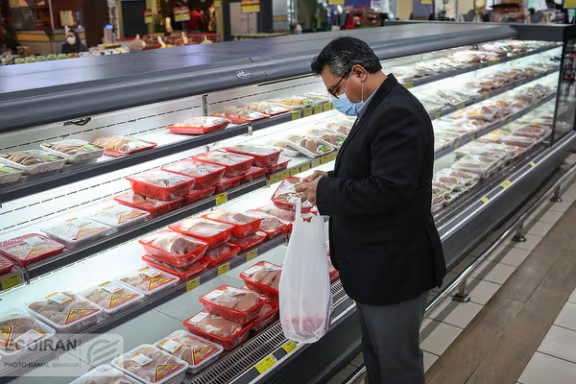
Over the last decade, Iranians have cut dairy consumption by 30% and meat by 17%, amid escalating poverty largely caused by the government's inefficient economic policies.
This month, Mohammad Reza Bani-Taba, the spokesman for Iran’s Dairy Industry Association, announced that per capita milk and dairy consumption in Iran has dropped to 70 kg/year, which is less than half the global average.
Bani-Taba did not specify the exact extent of the decline in dairy and milk consumption in recent years, nor did he clarify whether this reduction has been gradual or abrupt.
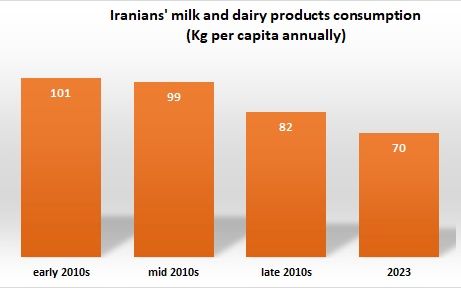
According to statistics of the Food and Agriculture Organization of the United Nations (FAO), the country’s per capita milk and dairy products consumption declined from 101 kg in 2010 to 70 kg in 2023.
While dietary habits vary across cultures, it is noteworthy that in neighboring Turkey, citizens consume 3.5 times more milk and dairy products than Iranians.
Turkey produces over 21 million tons of milk and dairy products annually, yet exports less than 0.5 million tons. In contrast, Iran, with only a third of Turkey's production, exports four times more than its western neighbor.
Iran’s milk and dairy products exports have surged by 500% in recent years, driven by plummeting domestic demand and the termination of the school milk distribution program. The government ceased free milk distribution in schools in the mid-2010s, significantly boosting exports. However, in late 2023, the government announced plans to reinstate the free milk program in schools.
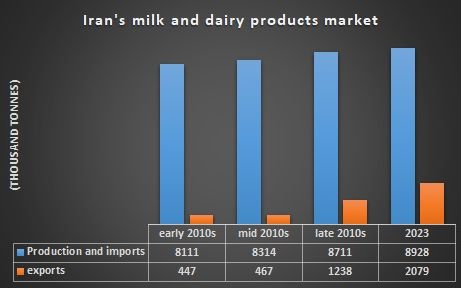
On meat consumption, FAO statistics indicate that consumption per capita in Iran has decreased from 38.6 kg in 2010 to 31.8 kg in 2023, reflecting a 17% decline.
Meat has experienced the highest inflation among food items in recent years, with prices surging above 100% in mid-2023. Just last month, meat prices saw a 74% year-on-year increase.
Official statistics also reveal a 22% decline in daily per capita calorie intake in Iran, dropping to 2,100 calories since the 2010s, with the situation worsening each year.
According to a 2023 report by the semi-official ILNA news agency, one-third of Iran’s population now lives in extreme poverty, with this number nearly doubling from 2020 to 2021.
However, the real figure is likely much higher. Official statistics from the Interior Ministry indicate that around 60% of Iranians live below the relative poverty line.
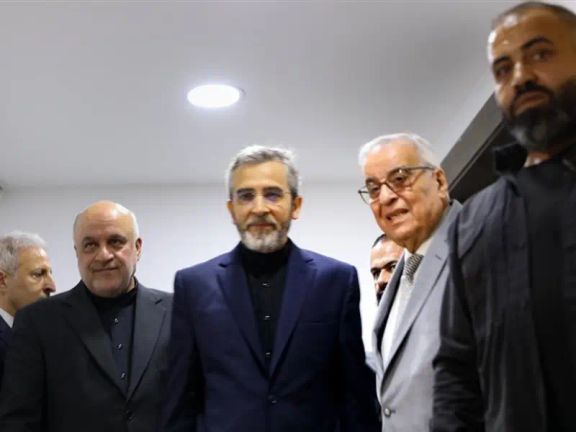
Iran’s acting Foreign Minister, Ali Bagheri Kani, has called Iran's proxy terror group Hezbollah in Lebanon an "anchor of stability and peace in the region" while the militia continues to bombard Israel's northern towns.
Calling the group, designated by countries including the UK and US the "Islamic Resistance", he lauded the actions which have seen well over 3,000 drones, rockets and missiles launched towards Israel since Iran-backed Hamas launched its invasion on Israel on October 7. Over 100,000 people in Israel's north have been displaced by the conflict and similar numbers from southern Lebanon.
In his first international visit following the sudden death of President Ebrahim Raisi and foreign minister Hossein Amir-Abdollahian in a helicopter crash last month, Bagheri arrived in Lebanon on Monday.
Hezbollah, Iran's biggest and most powerful proxy, funded, trained and armed by the regime, continues its daily exchanges of fire with Israeli forces amidst the ongoing Gaza war, the conflict on Israel's northern border its worst since the second Lebanon war.
Bagheri Kani’s visit marks the importance of Lebanon in Iran's 'Axis of Resistance', the collective name used to describe its proxies fighting Iran's archenemies, the US and Israel. With tens of thousands of militants and over 120,000 missiles ready to fire at Israel, Hezbollah remains Iran's greatest proxy project to date, a pet project of the Supreme Leader.
Hezbollah has supported Hamas since the invasion of October 7, along with Iran's proxies in Syria, Yemen, Iraq and Gaza, with missiles fired towards all of Israel's borders. In a single day, around 3,000 Hamas terrorists killed at least 1,200 mostly civilians and took around 250 more hostage to the strip.
Israel's relentless retaliatory attacks have seen over 36,000 killed in Gaza, according to Hamas, Israel claiming 14,000 or more terrorists have been killed in the operation.

GPS jamming has been seen across Iran as the Supreme Leader goes on tour amid increased security fears on the back of the sudden death of President Ebrahim Raisi.
Supreme Leader Ali Khamenei delivered a speech at the mausoleum of Ayatollah Ruhollah Khomeini on the 35th anniversary of his death on Monday, along with other high profile figures, leading to suspicions of jammed GPS signals to protect his whereabouts.
In addition to the ongoing protests against the government, the sudden death of President Ebrahim Raisi in a helicopter crash last month has revived unease about the safety of Iran's leaders, though officially, the government says there was no foul play. Raisi died alongside the country's foreign minister Hossein Amir-Abdollahian, another key figure in the government.
The Iranian navigation app Neshan has described the incident as "the most extensive GPS disruption" recorded to date. Users in Tehran reported anomalies in their location data, with maps inaccurately showing their positions at significant distances from actual locations.
Neshan's public relations team acknowledged the disruptions but did not clarify the cause. The ongoing issues with domestic navigation services, exacerbated by the government’s ban on popular apps like Waze, have forced many to rely on local alternatives, which are now proving unreliable.
After Mahsa Amini died in a morality police detention center in mid-September 2022, sparking nationwide protests, the government responded by blocking several widely used internet services, including Instagram and WhatsApp in a bid to quash the uprising which has proved the greatest challenge to the government since the founding of the Islamic Republic.
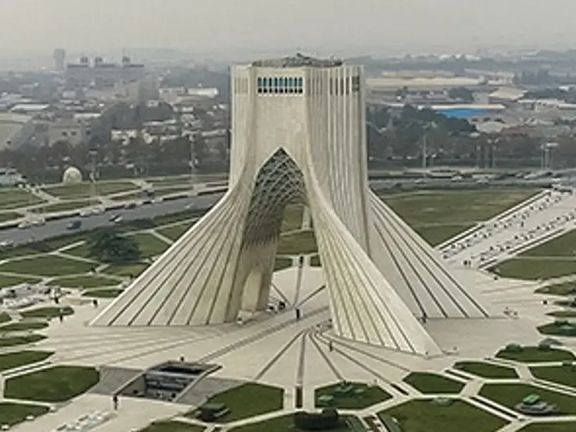
Tehran's historic Azadi Square, one of the city's most cherished landmarks, is scheduled for demolition within the next month, according to documentation revealed on social media.
The news has sparked outrage among Iranians online, who suspect the project to be a decision by Tehran’s hardline Mayor, Alireza Zakani, known for his recent initiatives to construct mosques in city parks.
Social media users are rallying support, urging fellow Iranians to disseminate the information to help safeguard the national symbol from destruction.
Alireza Nadali, the spokesperson for the Tehran City Council, denied the rumors, stating, "Azadi Square is the most important symbol of freedom-seeking in our country and will not be demolished under any circumstances."
Nadali added, "In fact, we are reviewing a plan that aims to preserve Azadi Square with its current identity and appearance, and to further develop it as a cultural square with a focus on the discourse of the Islamic Revolution."
Azadi Square, historically known as Shahyad Square before the Islamic Revolution, was commissioned by Mohammad Reza Pahlavi, the last Shah of Iran, originally designed to commemorate the 2,500th anniversary of the Imperial State of Iran. One of the most beloved symbols of the city, it ranks as the third most recommended site for tourists, following museums and palaces.
Last week, Hossein Amanat, the designer and chief architect of the Azadi Tower who has projects in Iran, China, the Middle East and North America, was awarded an honorary doctorate by the University of British Columbia in Canada. Born into a Baha'i family, Amanat moved to Canada a year following the 1979 revolution.